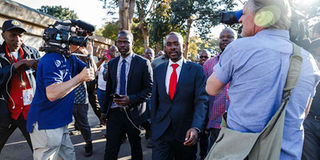Zimbabwe vote: what are the fraud claims?

Zimbabwean opposition party Movement for Democratic Change (MDC) Alliance president Nelson Chamisa (in a red tie) arrives at the Parirenyatwa Hospital in Harare, on August 2, 2018, to visit hospitalised victims following clashes between opposition supporters and security forces. PHOTO | JEKESAI NJIKIZANA | AFP
What you need to know:
- The election commission was synonymous with fraud and bias under Mugabe, when elections were often marred by deadly violence.
- The MDC repeatedly alleged before the election that a new electoral roll — compiled via biometric registration — was riddled with errors.
- Both the opposition and independent monitors complained of heavily disproportionate coverage of ZANU-PF in the state-controlled media.
HARARE
Zimbabwe's opposition has charged the ruling party with rigging the first election since the historic departure of autocrat Robert Mugabe, sparking a deadly crackdown on protesters by troops in Harare.
While the Zimbabwe Electoral Commission (ZEC) insists the election was fair, the opposition Movement for Democratic Change (MDC) has raised an array of fraud allegations.
International observers praised the largely peaceful conduct of election day itself on July 30.
But an EU mission said it had found an "un-level playing field" in which various factors were stacked towards the ruling ZANU-PF.
TRANSPARENCY
The ZEC was synonymous with fraud and bias under Mugabe, when elections were often marred by deadly violence.
The commission has again faced criticism, with European Union observers accusing it of a "persistent lack of inclusivity and transparency".
It also faced claims of bias over the layout of the ballot papers, which — set out in two alphabetical columns — gave President Emmerson Mnangagwa a prominent spot at the top of the page.
The ZEC has furiously denied allegations of bias and rigging.
ELECTORAL ROLL
The MDC repeatedly alleged before the election that a new electoral roll — compiled via biometric registration — was riddled with errors.
The electoral roll has long been a contentious feature of Zimbabwean elections, allegedly the rotten core of systematic rigging under Mugabe.
MDC leader Nelson Chamisa also complained that his party struggled to get hold of a copy of the roll to check for evidence of fraud despite repeated requests, when ZANU-PF already had one.
FOOD HANDOUTS
In a country where entrenched poverty and erratic weather have left more than a million people at risk of hunger, according to the World Food Programme, meals can have a powerful sway.
Mugabe was regularly accused of using food as a political tool to win support in poor rural areas, but Mnangagwa said such behaviour would be a thing of the past.
Yet Chamisa charged during the campaign that officials were withholding food aid from people due to their political affiliation.
Commonwealth election observers said in a report that the ruling party had continued to use their "incumbency to gain undue advantage, including the use of food".
VOTER INTIMIDATION
EU observers noted numerous instances of voter intimidation, such as "direct threats of violence (and) pressure on people to attend rallies".
Election monitors from the Commonwealth also said there was evidence of more indirect forms of intimidation, including using traditional leaders to lean on voters.
Traditional community chiefs have traditionally been close to the ZANU-PF, though a growing number have been at loggerheads with Mnangagwa's government.
MEDIA BIAS
Both the opposition and independent monitors complained of heavily disproportionate coverage of ZANU-PF in the state-controlled media, which dominates in Zimbabwe.
"State-owned TV, radio and newspapers were heavily biased in favour of the ruling party and incumbent president in their election-related coverage," the EU observer mission said.
It concluded: "The misuse of state resources, instances of coercion and intimidation, partisan behaviour by traditional leaders and overt bias in state media, all in favour of the ruling party, meant that a truly level playing field was not achieved."





